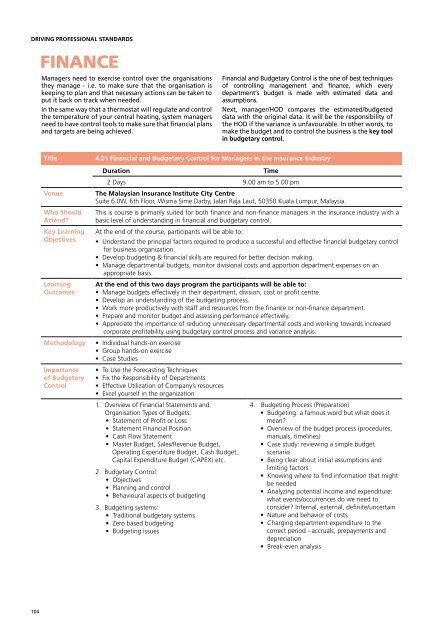DRIVING PROFESSIONAL STANDARDS
Create successful ePaper yourself
Turn your PDF publications into a flip-book with our unique Google optimized e-Paper software.
<strong>DRIVING</strong> <strong>PROFESSIONAL</strong> <strong>STANDARDS</strong><br />
2015 MII PROGRAMME DIRECTORY<br />
FINANCE<br />
Managers need to exercise control over the organisations<br />
they manage - i.e. to make sure that the organisation is<br />
keeping to plan and that necessary actions can be taken to<br />
put it back on track when needed.<br />
In the same way that a thermostat will regulate and control<br />
the temperature of your central heating, system managers<br />
need to have control tools to make sure that financial plans<br />
and targets are being achieved.<br />
Financial and Budgetary Control is the one of best techniques<br />
of controlling management and finance, which every<br />
department’s budget is made with estimated data and<br />
assumptions.<br />
Next, manager/HOD compares the estimated/budgeted<br />
data with the original data. It will be the responsibility of<br />
the HOD if the variance is unfavourable. In other words, to<br />
make the budget and to control the business is the key tool<br />
in budgetary control.<br />
Title<br />
4.01 Financial and Budgetary Control for Managers in the Insurance Industry<br />
Venue<br />
Who Should<br />
Attend<br />
Key Learning<br />
Objectives<br />
Learning<br />
Outcomes<br />
Methodology<br />
Importance<br />
of Budgetary<br />
Control<br />
Duration<br />
Time<br />
2 Days 9.00 am to 5.00 pm<br />
The Malaysian Insurance Institute City Centre<br />
Suite 6.0W, 6th Floor, Wisma Sime Darby, Jalan Raja Laut, 50350 Kuala Lumpur, Malaysia.<br />
This is course is primarily suited for both finance and non-finance managers in the insurance industry with a<br />
basic level of understanding in financial and budgetary control.<br />
At the end of the course, participants will be able to:<br />
• Understand the principal factors required to produce a successful and effective financial budgetary control<br />
for business organization.<br />
• Develop budgeting & financial skills are required for better decision making.<br />
• Manage departmental budgets, monitor divisional costs and apportion department expenses on an<br />
appropriate basis.<br />
At the end of this two days program the participants will be able to:<br />
• Manage budgets effectively in their department, division, cost or profit centre.<br />
• Develop an understanding of the budgeting process.<br />
• Work more productively with staff and resources from the finance or non-finance department.<br />
• Prepare and monitor budget and assessing performance effectively.<br />
• Appreciate the importance of reducing unnecessary departmental costs and working towards increased<br />
corporate profitability using budgetary control process and variance analysis.<br />
• Individual hands-on exercise<br />
• Group hands-on exercise<br />
• Case Studies<br />
• To Use the Forecasting Techniques<br />
• Fix the Responsibility of Departments<br />
• Effective Utilization of Company’s resources<br />
• Excel yourself in the organization<br />
1. Overview of Financial Statements and<br />
Organisation Types of Budgets:<br />
• Statement of Profit or Loss<br />
• Statement Financial Position<br />
• Cash Flow Statement<br />
• Master Budget, Sales/Revenue Budget,<br />
Operating Expenditure Budget, Cash Budget,<br />
Capital Expenditure Budget (CAPEX) etc.<br />
2. Budgetary Control:<br />
• Objectives<br />
• Planning and control<br />
• Behavioural aspects of budgeting<br />
3. Budgeting systems:<br />
• Traditional budgetary systems<br />
• Zero based budgeting<br />
• Budgeting issues<br />
4. Budgeting Process (Preparation)<br />
• Budgeting: a famous word but what does it<br />
mean<br />
• Overview of the budget process (procedures,<br />
manuals, timelines)<br />
• Case study: reviewing a simple budget<br />
scenario<br />
• Being clear about initial assumptions and<br />
limiting factors<br />
• Knowing where to find information that might<br />
be needed<br />
• Analyzing potential income and expenditure:<br />
what events/occurrences do we need to<br />
consider Internal, external, definite/uncertain<br />
• Nature and behavior of costs<br />
• Charging department expenditure to the<br />
correct period - accruals, prepayments and<br />
depreciation<br />
• Break-even analysis<br />
5. Variance Analysis (Facing the Actual)<br />
• What are the variances and why are they<br />
important<br />
• The budget is the plan i.e. understanding the<br />
need to proactively work towards budget and<br />
adhere to budget.<br />
• Comparing actuals to budgeted monthly<br />
• Comparing actuals to budgeted year to date<br />
• Understanding the significance of changes in<br />
variances<br />
• Causes of Budget Variances<br />
• Calculating Variances<br />
• Proper Variance Analysis<br />
• Flexing the budget<br />
6. The Sales /Revenue (Premium) Budget, Operating<br />
Expenses Budget (eg Claims), Cash Budget &<br />
Capital Expenditure Budget (CAPEX)<br />
• Why they are needed Do high profits<br />
necessarily mean everything is going well<br />
• Hypothetical Insurance Company Case Study:<br />
Preparing a Sales/Revenue (Premium), Expenses<br />
(Claims), Cash and Capital Expenditure Budget<br />
FEES<br />
MEMBER<br />
RM 900<br />
GROUP MEMBER<br />
RM 850<br />
NON MEMBER<br />
RM 1,100<br />
GROUP NON MEMBER<br />
RM 1,050<br />
7. Presenting the Departmental Budget<br />
• Giving clear information<br />
• Presenting the main variables<br />
• Getting agreement<br />
• Putting it clearly onto paper<br />
8. Reporting, Monitoring and Analysing the<br />
Organisation’s Master Budget and Variance<br />
Analysis for Management Decision Making<br />
• Preparing, monitoring and analysing the<br />
Master Budget vs Actual Performance<br />
(Monthly, Quarterly, Half Yearly and Annually)<br />
• Providing significant information to make<br />
effective decisions e.g. Premium, Claims,<br />
Operating Expenses etc.<br />
• Importance of Budgetary Control.<br />
• Case Study based on an insurance company<br />
on the Budget<br />
INTERNATIONAL<br />
USD 300<br />
GROUP INTERNATIONAL<br />
USD 280<br />
104 105


